-
Japan's disaster recovery expected to boost U.S. exports

America’s western sea ports and industries like timber and oil are expected to see an increase in activity as Japan’s reconstruction efforts swing into full gear; the natural disaster leveled large portions of Japan and to rebuild the country will need to import record amounts of logs, timber, and plywood
-
-
Listening to the sound of bullets
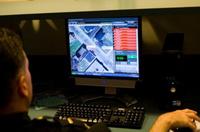
ShotSpotter systems relies on a system of acoustic sensors to identify the location from which a shot has been fired; the alerts are immediately conveyed to police dispatchers, 911 operators, and sometimes to officers in the field via laptops in patrol cars; the system includes a computer program which displays a comprehensive bird’s-eye view of the area, marking the location of the incident with a red dot and indicating the time and number of rounds fired
-
-
Disasters take toll on PartnerRe’s profits
On Monday PartnerRe Ltd., the international reinsurer, announced that its second quarter earnings fell 35 percent as a result of the devastating natural disasters that struck around the world
-
-
USDA declares twenty disaster zones in California
On Monday the U.S. Department of Agriculture (USDA) designated twenty counties across California as natural disaster areas, qualifying residents for federal assistance; severe weather in these areas resulted in large losses to this season’s sweet cherry and wine grape crops
-
-
Blast gauge gives medics, doctors critical information
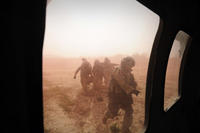
Researchers are working to enhance the safety of soldiers in the field through the development of a device that monitors the physical impacts of exposure to an explosive blast; 188,270 service members have suffered a traumatic brain injury in the last decade; the extent of injury is often difficult to discern, making diagnosis and selection of appropriate medical treatment challenging
-
-
Google acquires facial biometric company
Following Facebook’s decision to implement biometric facial recognition software, Google has acquired a company to boost its facial recognition capabilities; the search giant recently purchasd Pittsburgh Pattern Recognition (PittPatt), which develops technology that can search images and videos for a specific face
-
-
Filipino man guilty of selling UAV on eBay
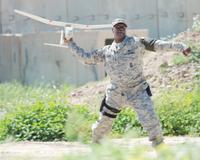
Last week a Filipino man pleaded guilty to violating arms export and smuggling laws by selling parts from an unmanned aerial vehicle (UAV) on eBay; in February, DHS officials arrested Henson Chua of Manila, Philippines after he shipped undercover agents a three-foot long, hand-launched, computer-controlled RQ-11A/B Raven surveillance drone
-
-
Blue ribbon commission calls for interim off site waste storage
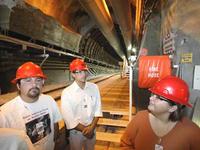
After deciding to stop the Yucca Mountain nuclear waste repository project, President Obama appointed a blue Ribbon commission to examine alternatives; the first report from the commission calls for interim storage of nuclear waste not on the site of nuclear power plants, and for the creation of a new corporation to develop one or more deep geological repositories “as expeditiously as possible”
-
-
Averting bridge disasters: new sensors could save hundreds of lives
One of every four U.S. highway bridges has known structural problems or exceeded its intended life-span. Most only get inspected once every one or two years; University of Maryland researcher has developed a new sensor that measures indicators of a bridge’s structural health, such as strain, vibration, flexibility, and development of metal cracks; the sensors are expected to last more than a decade, with each costing about $20
-
-
Bio detection firm raises $14 million in stock deal
Last week PositiveID Corp.,a developer of biological threat detection technology and medical diagnostics, announced that it had signed a deal to raise almost $14 million in additional funding through the sale of its stock
-
-
Safran completes L-1 acquisition, becomes world’s biometric leader
In the latest series of purchases by traditional defense firms seeking to diversify their portfolios, French defense company Safran recently completed its $1 billion acquisition of biometric solution provider L-1 Identity Solutions making it the world’s market leader in biometrics
-
-
Turning sport vehicle into military machine
U.K. companies to transform a proven sports vehicle into a high performance, off road vehicle for special forces, border patrol, reconnaissance, rapid intervention or strike roles; the Wildcat 500 DKR boasts high speed performance in harsh environments
-
-
U.S. businesses want fewer restrictions on skilled foreign workers
On Tuesday representatives from two major U.S. companies, Microsoft and Nasdaq, headed to the Hill to testify before a Senate subcommittee on immigration policies and its effects on highly skilled foreign workers; speaking before the Senate Judiciary Subcommittee on Immigration, Refugees, and Border Security, Brad Smith, Microsoft’s general Counsel, urged lawmakers to ease restrictions and immigration laws for skilled overseas workers
-
-
Expanding Yuma flight testing schedule for Argus UAV
The World Surveillance Group (WSGI) revealed its plans of extending the flight testing schedule for its strange-looking Argus One UAV at the Yuma facilities at the U.S Army grounds in Arizona
-
-
Portable biometric system for police officers
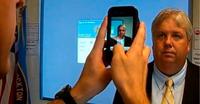
Police now have a new low-cost, portable biometric tool in their arsenal to quickly and accurately identify a suspect: an Apple iPhone; using MORIS (Mobile Offender Recognition and Information System), an app developed by BI2 Technologies, police officers can now use an Apple iPhone to scan a suspect’s fingerprint or snap a photo of their face to scan their iris
-
More headlines
The long view
Factories First: Winning the Drone War Before It Starts
Wars are won by factories before they are won on the battlefield,Martin C. Feldmann writes, noting that the United States lacks the manufacturing depth for the coming drone age. Rectifying this situation “will take far more than procurement tweaks,” Feldmann writes. “It demands a national-level, wartime-scale industrial mobilization.”
Trump Is Fast-Tracking New Coal Mines — Even When They Don’t Make Economic Sense
In Appalachian Tennessee, mines shut down and couldn’t pay their debts. Now a new one is opening under the guise of an “energy emergency.”
Smaller Nuclear Reactors Spark Renewed Interest in a Once-Shunned Energy Source
In the past two years, half the states have taken action to promote nuclear power, from creating nuclear task forces to integrating nuclear into long-term energy plans.
